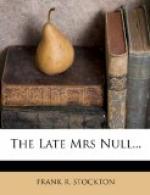Lawrence declined to be seated, but was very willing to talk. “Was it the proprietor of this establishment,” he asked, “who went out to get the money changed??”
“Yes, sir,” she answered. “That is Mr Candy.”
“A queer name,” said Lawrence, smiling.
The girl looked up at him, and smiled in return. There was a very perceptible twinkle in her eyes, which seemed to be eyes that would like to be merry ones, and a slight movement of the corners of her mouth which indicated a desire to say something in reply, but, restrained probably by loyalty to her employer, or by prudent discretion regarding conversation with strangers, she was silent.
Lawrence, however, continued his remarks. “The whole business seems to me very odd. Suppose I were to come here and ask for information as to where I could get a five-dollar note changed; would Mr Candy be able to tell me?”
“He would do in that case just as he does in all others,” she said; “first, he would go and find out, and then he would let you know. Giving information is only half the business; finding things out is the other half. That’s what he’s doing now.”
“So, when he comes back,” said Lawrence, “he’ll have a new bit of information to add to his stock on hand, which must be a very peculiar one, I fancy.”
The cashier smiled. “Yes,” she said, “and a very useful one, too, if people only knew it.”
“Don’t they know it?” asked Lawrence. “Don’t you have plenty of custom?”
At this moment the door opened, Mr Candy entered, and the conversation stopped.
“Sorry to keep you waiting, sir,” said the proprietor, passing some money to the cashier over the curtain, who, thereupon, handed two dollars and ninety-three cents to Lawrence through the little opening in front.
“If you call the day after to-morrow, the information will be ready for you,” said Mr Candy, as the gentleman departed.
On the appointed day, Lawrence came again, and found nobody in the place but the cashier, who handed him a note.
“Mr Candy left this for you, in case he should not be in when you called,” she said.
The note stated that the search for the address of Junius Keswick had opened very encouragingly, but as it was quite evident that said person was not now in the city, the investigations would have to be carried on on a more extended scale, and a deposit of three dollars would be necessary to meet expenses.
Lawrence looked from the note to the cashier, who had been watching him as he read. “Does Mr Candy want me to leave three dollars with you?” he asked.
“That’s what he said, sir.”
“Well,” said Lawrence, “I don’t care about paying for unlimited investigation in this way. If the gentleman I am in search of has left the city, and Mr Candy has been able to find out to what place he went, he should have told me that, and I would have decided whether or not I wanted him to do anything more.”




